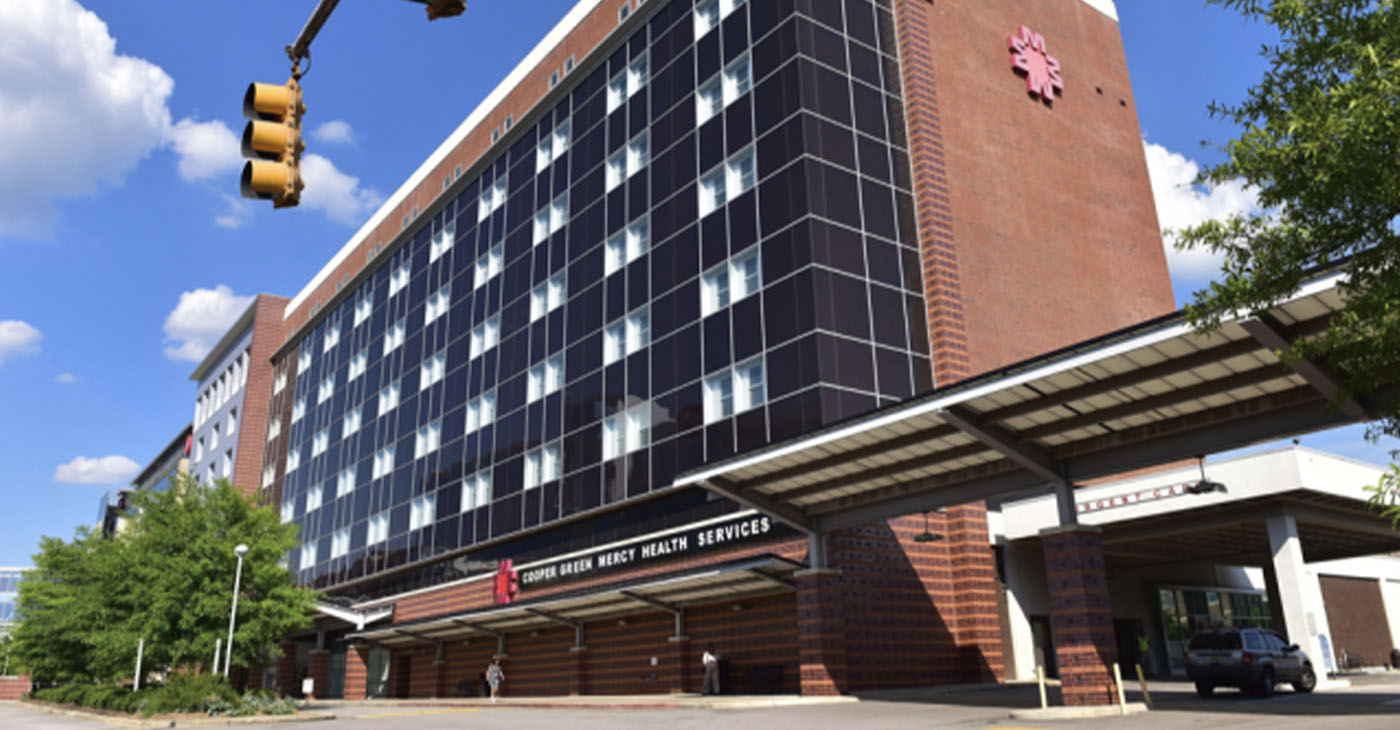#NNPA BlackPress
Cooper Green Mercy Health: 50 Years of Care for the Neediest
BIRMINGHAM TIMES — “We are building a first-class medical facility to serve the residents of Jefferson County,” said David Randall, chief strategy officer for the UAB Health System and board president and CEO of the Cooper Green Mercy Health Services Authority. “Jefferson County leadership and UAB are committed to providing the highest-quality health care for Cooper Green patients, and this new facility is an important step toward achieving that goal.”
The post Cooper Green Mercy Health: 50 Years of Care for the Neediest first appeared on BlackPressUSA.

By Nicole S. Daniel | The Birmingham Times
Cooper Green Mercy Health Services, the facility that has cared for Jefferson County’s underserved population, is celebrating its 50th year this fall—and at the same time preparing for the next 50 and beyond with a brand new $120 million, five-story building.
One word usually comes to mind for those familiar with the facility: “Lifesaver.”
That’s a word used by Maralyn Mosley, 84, a health care advocate who, after going through a divorce, returned to Birmingham from New York in December 1988 and found out she had high blood pressure.
“I was using a public health clinic in North Birmingham that was run by the health department. When they closed down the adult medicine clinic, I went to Cooper Green. I went to the emergency department, and they immediately took me in. I was an indigent Black woman, overweight,” said Mosley, who remembers she was never asked whether she had a job or money.
“They started to treat my high blood pressure and gave me enough medication to see me through,” she added. “That was my introduction to Cooper Green, and I have been there ever since. I was one of the many patients they served that had no health care [coverage]. I didn’t [have] a lot of money, so Cooper Green was a lifesaver for me, as it was for a lot of people.”

Former Jefferson County CEO Tony Petelos, outside Cooper Green Mercy Health Services on Sixth Ave. South. (Joe Songer, For The Birmingham Times)
Tony Petelos, former Jefferson County Manager, is one of those. He recalls attending a 2014 meeting at Cooper Green during which he thought to himself, “I know something is going on.”
After the meeting, Petelos went downstairs to the urgent care facility because his primary doctor had retired. After undergoing a series of tests, he was told to visit a urologist, a medical professional who specializes in diagnosing and treating diseases of the urinary tract and the male reproductive system.
“When I did that, I found out I had bladder and prostate cancer. So, the beginning of my cancer journey was at Cooper Green, which informed me that I needed to go see a specialist, which I did,” said Petelos, who is now cancer-free.
While Cooper Green has been lifesaver for the last 50 years, Petelos said he’s very excited to see the facility move into a new era.
“It has saved a lot of lives and helped people that could not afford insurance or did not have other means recover from sicknesses and injuries,” he said. “[I am excited to see] a state-of-the-art facility that will be able to continue to provide services to some of the poorest people in Jefferson County, as well as to the working poor that don’t have insurance.”
State-of-the-Art

Last week, the Cooper Green Mercy Health Services Authority received final approval from the Board of Trustees of the University of Alabama System to move forward with plans to replace the current Cooper Green building with a state-of-the-art medical clinic; construction should begin this winter. The new facility—a five-story, 207,000-square-foot building with an overall estimated cost of $120 million—will be built on the site of the former Cooper Green parking deck, which was demolished earlier this year.
The building will feature new equipment, including plans for a magnetic resonance imaging (MRI) machine that will ease scheduling for Cooper Green patients who need screening. Other amenities that will improve access to care include an expanded rehabilitation suite with a covered outdoor section for developing outdoor skills, such as navigating curbs and different ground surfaces.
In addition, the new facility will house several other professional and community services, such as Cahaba Dental, the Recovery Resource Crisis Center, the University of Alabama at Birmingham (UAB) Community Psychiatry Program, and the UAB School of Nursing Providing Access to Healthcare (PATH) Clinic.
“We are building a first-class medical facility to serve the residents of Jefferson County,” said David Randall, chief strategy officer for the UAB Health System and board president and CEO of the Cooper Green Mercy Health Services Authority. “Jefferson County leadership and UAB are committed to providing the highest-quality health care for Cooper Green patients, and this new facility is an important step toward achieving that goal.”
Raegan Durant, M.D., medical director for Cooper Green, said investment in the new building “is a sign of our commitment to ensuring that there will be another 50 years of providing … care and services to [underserved] populations.”
Mercy Hospital opened in 1972 to provide health care to all residents of Jefferson County, regardless of ability to pay. In 1975, the hospital was renamed after Birmingham mayor and Jefferson County Commission president Cooper Green.
Over the years, the facility faced several challenges and changes. Once a 319-bed inpatient hospital, Cooper Green Mercy transitioned to a medical-service clinic in August 2012, after a majority of the Jefferson County Commission voted to close the inpatient care unit and emergency room.
On Jan. 1, 2013, Cooper Green Hospital closed and began operating as an urgent care center with primary clinics. In 2020, a UAB-led authority assumed responsibility for the day-to-day operations at Cooper Green Mercy Health services, ushering in a new era of care for the indigent population in Jefferson County.
“The goal for us is to expand care … but also bring to bear UAB’s expertise around larger purchasing,” Randall said at the time.
Exemplary Care
Despite all of the changes, Cooper Green’s exemplary care has never changed, Mosely said. Although hundreds of patients were in and out of the facility, doctors always showed compassion and concern.
“They did dynamite work considering the number of patients they saw in a day,” she said.

Maralynn Mosley (Birmingham Times file photo)
When Mosley first became a patient, Cooper Green had candy stripers: “Young women wearing candy-striped aprons would come around, especially in the morning, and offer you orange juice and crackers,” Mosely recalled. “That was part of Cooper Green, and that was nice.”
Meanwhile, some of the doctors would help patients enroll in programs that would decrease the cost of medication.
“If you were indigent … your doctor or your primary doctor would fill out some papers for you. My primary said to me, ‘Ms. Mosley, I am going to fill out this form for you, so the drug company will send your high blood pressure medication directly to you, and it won’t cost you anything.’”
At the time, Mosley was struggling financially and couldn’t afford to pay for her medication.
“I would get half of it filled for two weeks and the other half the next two weeks, so it was God-sent when my primary [physician] filled out the forms for me … to receive my high blood pressure medication at no cost,” she said. “It was a lifesaver.”
Like most, Mosley is excited about Cooper Green’s 50th anniversary. “I think it’s tremendous that Cooper Green has survived 50 years,” she said. “I believe they have provided quality health care to the citizens in Jefferson County, and not just in Birmingham.”
As for the new building Mosley said, “I’m excited. Just because you are poor, does that mean you don’t deserve the best? I think the new building is going to be fabulous.”
Cooper Green Mercy Health Services operates as an outpatient clinic at 1515 6th Ave. S., Birmingham, AL 35233. Urgent care is open Monday through Friday, from 9 a.m. to 6 p.m., and clinics are open from 8 a.m. to 5 p.m. To get connected with Cooper Green, call 205-930-3377.
This article originally appeared in The Birmingham Times.
The post Cooper Green Mercy Health: 50 Years of Care for the Neediest first appeared on BlackPressUSA.
#NNPA BlackPress
Beloved Actor and Activist Louis Cameron Gossett Jr. Dies at 87
NNPA NEWSWIRE — Louis Gossett Jr., the groundbreaking actor whose career spanned over five decades and who became the first Black actor to win an Academy Award as Best Supporting Actor for his memorable role in “An Officer and a Gentleman,” has died. Gossett, who was born on May 27, 1936, in Brooklyn, N.Y., was 87. Recognized early on for his resilience and nearly unmatched determination, Gossett arrived in Los Angeles in 1967 after a stint on Broadway.
The post Beloved Actor and Activist Louis Cameron Gossett Jr. Dies at 87 first appeared on BlackPressUSA.

By Stacy M. Brown
NNPA Newswire Senior National Correspondent
@StacyBrownMedia
Louis Gossett Jr., the groundbreaking actor whose career spanned over five decades and who became the first Black actor to win an Academy Award as Best Supporting Actor for his memorable role in “An Officer and a Gentleman,” has died. Gossett, who was born on May 27, 1936, in Brooklyn, N.Y., was 87. Recognized early on for his resilience and nearly unmatched determination, Gossett arrived in Los Angeles in 1967 after a stint on Broadway.
He sometimes spoke of being pulled over by law enforcement en route to Beverly Hills, once being handcuffed to a tree, which he remembered as a jarring introduction to the racial tensions of Hollywood. In his memoir “An Actor and a Gentleman,” Gossett recounted the ordeal, noting the challenges faced by Black artists in the industry. Despite the hurdles, Gossett’s talent shone brightly, earning him acclaim in groundbreaking productions such as “A Raisin in the Sun” alongside Sidney Poitier. His Emmy-winning portrayal of Fiddler in “Roots” solidified his status as a trailblazer, navigating a landscape fraught with racial prejudice.
According to the HistoryMakers, which interviewed him in 2005, Gossett’s journey into the limelight began during his formative years at PS 135 and Mark Twain Junior High School, where he demonstrated early leadership as the student body president. His passion for the arts blossomed when he starred in a “You Can’t Take It With You” production at Abraham Lincoln High School, catching the attention of talent scouts who propelled him onto Broadway’s stage in “Take A Giant Step.” His stellar performance earned him the prestigious Donaldson Award for Best Newcomer to Theatre in 1952. Though initially drawn to sports, Gossett’s towering 6’4” frame and athletic prowess led him to receive a basketball scholarship at New York University. Despite being drafted by the New York Knicks in 1958, Gossett pursued his love for acting, honing his craft at The Actors Studio under the tutelage of luminaries like John Sticks and Peggy Fury.
In 1961, Gossett’s talent caught the eye of Broadway directors, leading to roles in acclaimed productions such as “Raisin in the Sun” and “The Blacks,” alongside legends like James Earl Jones, Cicely Tyson, Roscoe Lee Brown, and Maya Angelou. Transitioning seamlessly to television, Gossett graced small screens with appearances in notable shows like “The Bush Baby” and “Companions in Nightmare.” Gossett’s silver screen breakthrough came with his role in “The Landlord,” paving the way for a prolific filmography that spanned over 50 movies and hundreds of television shows. From “Skin Game” to “Lackawanna Blues,” Gossett captivated audiences with his commanding presence and versatile performances.
However, his portrayal of “Fiddler” in Alex Haley’s groundbreaking miniseries “Roots” earned Gossett critical acclaim, including an Emmy Award. The HistoryMakers noted that his golden touch extended to the big screen, where his role as Sergeant Emil Foley in “An Officer and a Gentleman” earned him an Academy Award for Best Supporting Actor, making him a trailblazer in Hollywood history.
Beyond the glitz and glamour of Hollywood, Gossett was deeply committed to community activism. In 1964, he co-founded a theater group for troubled youth alongside James Earl Jones and Paul Sorvino, setting the stage for his lifelong dedication to mentoring and inspiring the next generation. Gossett’s tireless advocacy for racial equality culminated in the establishment of Eracism, a nonprofit organization dedicated to combating racism both domestically and abroad. Throughout his illustrious career, Gossett remained a beacon of strength and resilience, using his platform to uplift marginalized voices and champion social change. Gossett is survived by his children, Satie and Sharron.
The post Beloved Actor and Activist Louis Cameron Gossett Jr. Dies at 87 first appeared on BlackPressUSA.
#NNPA BlackPress
COMMENTARY: D.C. Crime Bill Fails to Address Root Causes of Violence and Incarceration
WASHINGTON INFORMER — The D.C. crime bill and so many others like it are reminiscent of the ‘94 crime bill, which produced new and harsher criminal sentences, helped deploy thousands of police and surveilling methods in Black and brown communities, and incentivized more states to build prisons through a massive infusion of federal funding. While it is not at the root of mass incarceration, it significantly accelerated it, forcing a generation of Black and brown families into a never-ending cycle of state-sanctioned violence and incarceration.
The post COMMENTARY: D.C. Crime Bill Fails to Address Root Causes of Violence and Incarceration first appeared on BlackPressUSA.

By Kaili Moss and Jillian Burford | Washington Informer
Mayor Bowser has signed the “Secure DC” omnibus bill passed by the D.C. Council last month. But we already know that this bill will be disastrous for all of D.C., especially for Black and brown residents.
While proponents claim that this legislation “will make D.C. residents safer and more secure,” it actually does nothing to address the root of the harm in the first place and instead maintains a cycle of violence, poverty, and broken community ties. The omnibus bill calls for increased surveillance, drug-free zones, and will expand pre-trial detention that will incarcerate people at a significantly higher rate and for an indeterminate amount of time before they are even tried. This bill will roll back decades of nationwide policy reform efforts and initiatives to keep our communities safe and whole, which is completely contradictory to what the “Secure” D.C. bill claims it will do.
What is unfolding in Washington, D.C., is part of a dangerous national trend. We have seen a resurrection of bad crime bills in several jurisdictions across the country — a phenomenon policy experts have named “zombie laws,” which are ineffective, costly, dangerous for communities of color and, most importantly, will not create public safety. Throwing more money into policing while failing to fund preventative measures does not keep us safe.
The D.C. crime bill and so many others like it are reminiscent of the ‘94 crime bill, which produced new and harsher criminal sentences, helped deploy thousands of police and surveilling methods in Black and brown communities, and incentivized more states to build prisons through a massive infusion of federal funding. While it is not at the root of mass incarceration, it significantly accelerated it, forcing a generation of Black and brown families into a never-ending cycle of state-sanctioned violence and incarceration. Thirty years later, despite spending billions each year to enforce these policies with many of these provisions remaining in effect, it has done very little to create long-term preventative solutions. Instead, it placed a permanent moving target on the backs of Black people, and the D.C. crime bill will do the same.
The bill calls for more pretrial detention. When our loved ones are held on pretrial detention, they are held on the presumption of guilt for an indeterminate amount of time before ever seeing a judge, which can destabilize people and their families. According to experts at the Malcolm Weimer Center for Social Policy at Harvard University, just one day in jail can have “devastating consequences.” On any given day, approximately 750,000 people are held in jails across the nation — a number that beats our nation’s capital population by about 100,000. Once detained, people run the risk of losing wages, jobs, housing, mental and health treatments, and time with their families. Studies show that pretrial detention of even a couple of days makes it more likely for that person to be rearrested.
The bill also endangers people by continuing a misguided and dangerous War on Drugs, which will not get drugs off the street, nor will it deter drug use and subsequent substance use disorders (SUDs). Drug policies are a matter of public health and should be treated as such. Many states such as Alabama, Iowa and Wisconsin are treating the current fentanyl crisis as “Crack 2.0,” reintroducing a litany of failed policies that have sent millions to jails and prisons instead of prioritizing harm reduction. Instead, we propose a simple solution: listen to members of the affected communities. Through the Decrim Poverty D.C. Coalition, community members, policy experts and other stakeholders formed a campaign to decriminalize drugs and propose comprehensive legislation to do so.
While there are many concerning provisions within the omnibus bill, car chases pose a direct physical threat to our community members. In July 2023, NBC4 reported that the D.C. Council approved emergency legislation that gave MPD officers the ability to engage in vehicular pursuits with so-called “limited circumstances.” Sgt. Val Barnes, the head of MPD’s carjacking task force, even expressed concern months before the decision, saying, “The department has a pretty strict no-chase policy, and obviously for an urban setting and a major metropolitan city, that’s understandable.” If our law enforcement officers themselves are operating with more concern than our elected officials, what does it say about the omnibus bill’s purported intention to keep us safe?
And what does it mean when the risk of bodily harm is posed by the pursuit itself? On Saturday, Feb. 10, an Eckington resident had a near-miss as a stolen car barreled towards her and her dog on the sidewalk with an MPD officer in pursuit. What responsibility does the city hold if this bystander was hit? What does restitution look like? Why are our elected officials pushing for MPD officers to contradict their own policies?
Just a few summers ago during the uprisings of 2020, we saw a shift in public perspectives on policing and led to legislation aimed at limiting police power after the highly-publicized murders of loved ones Breonna Taylor and George Floyd — both victims of War on Drugs policing and the powers gained from the ’94 crime bill. And yet here we are. These measures do not keep us safe and further endanger the health of our communities. Studies show that communities that focus on harm reduction and improving material conditions have a greater impact on public safety and community health. What’s missing in mainstream conversations about violent crime is the violence that stems from state institutions and structures that perpetuate racial and class inequality. The people of D.C. deserve to feel safe, and that includes feeling safe from the harms enacted by the police.
Kaili Moss is a staff attorney at Advancement Project, a national racial justice and legal organization, and Jillian Burford is a policy organizer at Harriet’s Wildest Dreams.
The post COMMENTARY: D.C. Crime Bill Fails to Address Root Causes of Violence and Incarceration first appeared on BlackPressUSA.
#NNPA BlackPress
Mayor, City Council President React to May 31 Closing of Birmingham-Southern College
THE BIRMINGHAM TIMES — “This is a tragic day for the college, our students, our employees, and our alumni, and an outcome so many have worked tirelessly to prevent,” Rev. Keith Thompson, chairman of the BSC Board of Trustees said in an announcement to alumni. “We understand the devastating impact this has on each of you, and we will now direct our efforts toward ensuring the smoothest possible transition for everyone involved.”
The post Mayor, City Council President React to May 31 Closing of Birmingham-Southern College first appeared on BlackPressUSA.

By Barnett Wright | The Birmingham Times
Birmingham-Southern College will close on May 31, after more than a century as one of the city’s most respected institutions.
“This is a tragic day for the college, our students, our employees, and our alumni, and an outcome so many have worked tirelessly to prevent,” Rev. Keith Thompson, chairman of the BSC Board of Trustees said in an announcement to alumni. “We understand the devastating impact this has on each of you, and we will now direct our efforts toward ensuring the smoothest possible transition for everyone involved.”
There are approximately 700 students enrolled at BSC this semester.
“Word of the decision to close Birmingham Southern College is disappointing and heartbreaking to all of us who recognize it as a stalwart of our community,” Birmingham Mayor Randall Woodfin said in a statement. “I’ve stood alongside members of our City Council to protect this institution and its proud legacy of shaping leaders. It’s frustrating that those values were not shared by lawmakers in Montgomery.”
Birmingham City Council President Darrell O’Quinn said news of the closing was “devastating” on multiple levels.
“This is devastating for the students, faculty members, families and everyone affiliated with this historic institution of higher learning,” he said. “It’s also profoundly distressing for the surrounding community, who will now be living in close proximity to an empty college campus. As we’ve seen with other institutions that have shuttered their doors, we will be entering a difficult chapter following this unfortunate development … We’re approaching this with resilience and a sense of hope that something positive can eventually come from this troubling chapter.”
The school first started as the merger of Southern University and Birmingham College in 1918.
The announcement comes over a year after BSC officials admitted the institution was $38 million in debt. Looking to the Alabama Legislature for help, BSC did not receive any assistance.
This past legislative session, Sen. Jabo Waggoner sponsored a bill to extend a loan to BSC. However, the bill subsequently died on the floor.
Notable BSC alumni include former New York Times editor-in-chief Howell Raines, former U.S. Sen. Howell Heflin and former Alabama Supreme Court Chief Justice Perry O. Hooper Sr.
This story will be updated.
The post Mayor, City Council President React to May 31 Closing of Birmingham-Southern College first appeared on BlackPressUSA.
-

 Activism4 weeks ago
Activism4 weeks agoOakland Post: Week of March 20 – 26, 2024
-

 #NNPA BlackPress3 weeks ago
#NNPA BlackPress3 weeks agoCOMMENTARY: D.C. Crime Bill Fails to Address Root Causes of Violence and Incarceration
-

 #NNPA BlackPress3 weeks ago
#NNPA BlackPress3 weeks agoMayor, City Council President React to May 31 Closing of Birmingham-Southern College
-

 #NNPA BlackPress3 weeks ago
#NNPA BlackPress3 weeks agoCOMMENTARY: Lady Day and The Lights!
-

 #NNPA BlackPress3 weeks ago
#NNPA BlackPress3 weeks agoFrom Raids to Revelations: The Dark Turn in Sean ‘Diddy’ Combs’ Saga
-

 #NNPA BlackPress3 weeks ago
#NNPA BlackPress3 weeks agoBaltimore Key Bridge Catastrophe: A City’s Heartbreak and a Nation’s Alarm
-

 Activism3 weeks ago
Activism3 weeks agoOakland Post: Week of March 27 – April 2, 2024
-

 #NNPA BlackPress3 weeks ago
#NNPA BlackPress3 weeks agoBaltimore’s Key Bridge Struck by Ship, Collapses into Water

















































